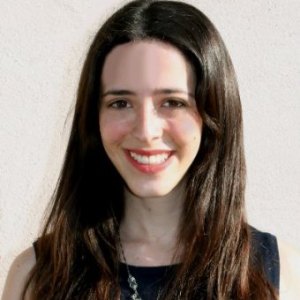*The article is first published on 100kstrong.org on 20 December, 2017. Please click HERE toread.
US-China YoungPros
A generation of American professionals equipped to engage with China
This series showcases young American professionals who have studied Mandarin for any length of time, including studying abroad in China. Where are they now? How have their studies abroad, and Mandarin language studies more broadly, shaped their experience as young professionals?
Today we feature Maya Cypris:
Maya recently graduated from the Yenching Academy of Peking University whereshe earned her Master’s in China Studies with emphasis in business, technology and innovation in China.
Having studied Business Administration and East Asian Studies as an undergraduate at the Hebrew University in Jerusalem, Maya came back to China in 2015 to study at Yenching with some previous experience in the country, a working proficiency of Mandarin, and a clear reason for why she wanted to be there.
“After finishing my undergraduate studies, I wanted a long-term option to study Chinese more seriously,” she said. “Yenching came on my radar, it seemed like a very interesting prospect, and so I applied.” The opportunity afforded Maya two years of expense-free study and living in Beijing, with a Master’s degree at the end of it.
Maya’s studies in business naturally led her to East Asia as a region. Yet, it was China’s meteoric rise as the breakout star of the region that earned her focus. She said, “Before I started undergrad I never had exposure to China or Chinese. I never thought about it. But I, like everyone else, began to hear more and more about how things were changing in China. It was natural to combine my studies in business with studies in China. It also became obvious that studying the language came with the territory”.
Maya visited China twice during her undergraduate studies both to improve her Mandarin and to travel. She traveled to Sichuan and Jilin provinces, respectively. During this experience she began to see the indispensable role of language learning in bridging cultural gaps.
“Chinese culture is based on trust”, she said. “…The people trust you a lot more when you are able to communicate with them in their language. It shows that you made effort and that you really care; otherwise there is an arm’s length relationship. There is a lot of pride in history, language and culture, and when they see that a newcomer has made an effort to relate, it completely changes the dynamic”.
How much more important one’s Mandarin language skills become as the appeal of building a career in China attracts increasing numbers of young international professionals, students, and fresh graduates. “As a foreigner you are already in a distinct category in China,” Maya said. “Within that category, there is a spectrum and that spectrum is based on how well you speak Chinese.” This is clear in many ways, from the way you are treated (more openness or less) to the types of opportunities you have access to.

USCS: Advice to current and future Mandarin learners?
MC: A lot of people expect language learning to be a linear process. Learning Chinese for me has been a complete rollercoaster. There can be weeks where I am sharp at Chinese, then other days when I don’t understand anything and can’t express anything, either because I’m not in a good mood or I’m tired. If I’m in China for a long time, sometimes I feel overwhelmed and fatigued. You can only learn so much in a day. Don’t be discouraged if you’re not progressing in a linear way; give it some time so you can actually see how much progress you’ve made.
Maya currently operates “Innovated in China”, an online platform she co-founded that aims to educate Western audiences on innovation, technology, and business in China. Innovated in China was born out of her Yenching Academy Master’s thesis, and has grown to a collaborative digital project shedding light on the Chinese innovation engine. She is currently completing an internship in Beijing as a financial analyst at an independent China-focused investment bank (where the working language is Mandarin). She aims to continue this line of work in Israel.